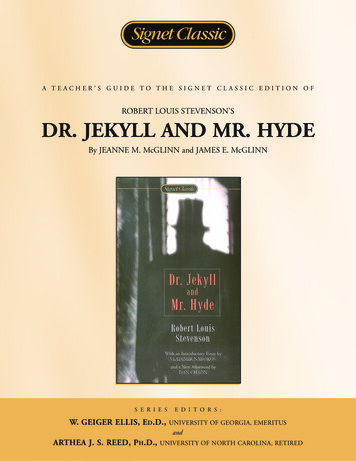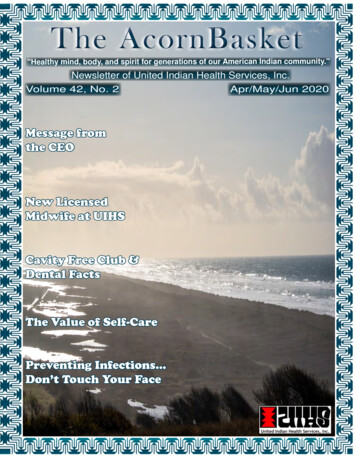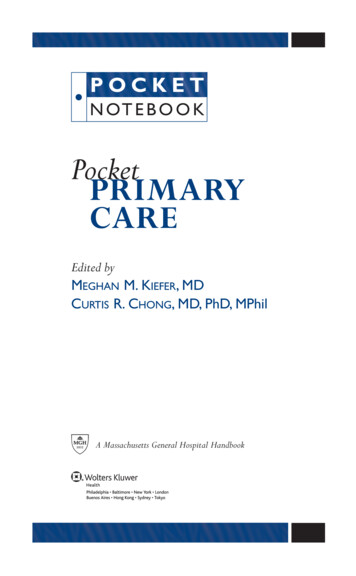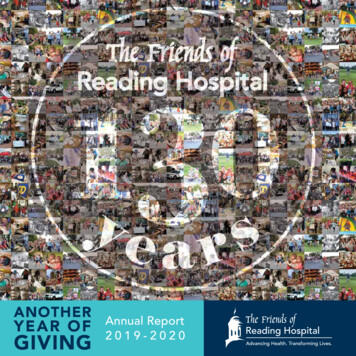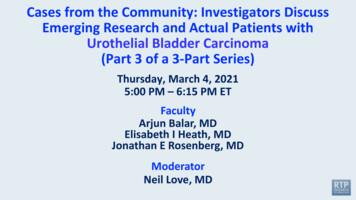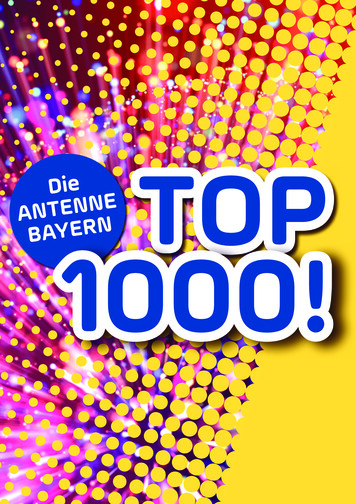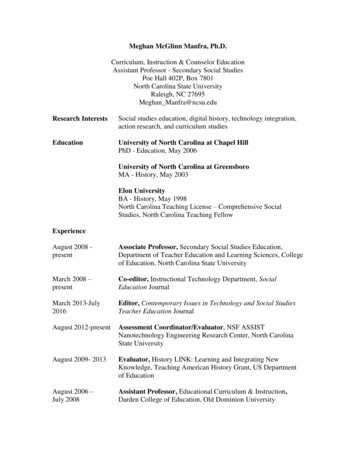
Transcription
Meghan McGlinn Manfra, Ph.D.Curriculum, Instruction & Counselor EducationAssistant Professor - Secondary Social StudiesPoe Hall 402P, Box 7801North Carolina State UniversityRaleigh, NC 27695Meghan Manfra@ncsu.eduResearch InterestsSocial studies education, digital history, technology integration,action research, and curriculum studiesEducationUniversity of North Carolina at Chapel HillPhD - Education, May 2006University of North Carolina at GreensboroMA - History, May 2003Elon UniversityBA - History, May 1998North Carolina Teaching License – Comprehensive SocialStudies, North Carolina Teaching FellowExperienceAugust 2008 presentAssociate Professor, Secondary Social Studies Education,Department of Teacher Education and Learning Sciences, Collegeof Education, North Carolina State UniversityMarch 2008 –presentCo-editor, Instructional Technology Department, SocialEducation JournalMarch 2013-July2016Editor, Contemporary Issues in Technology and Social StudiesTeacher Education JournalAugust 2012-presentAssessment Coordinator/Evaluator, NSF ASSISTNanotechnology Engineering Research Center, North CarolinaState UniversityAugust 2009- 2013Evaluator, History LINK: Learning and Integrating NewKnowledge, Teaching American History Grant, US Departmentof EducationAugust 2006 –July 2008Assistant Professor, Educational Curriculum & Instruction,Darden College of Education, Old Dominion University
August 2005 –May 2006Research Assistant, Technology Integration for Social StudiesTeaching and Learning, University of North Carolina ChapelHillAugust 2003 –August 2005Teaching Assistant, Masters of Education (M.Ed.) forExperienced Teachers, Social Studies Cohort, University ofNorth Carolina Chapel HillAugust 1998 –May 2003High School Social Studies Teacher, Guilford County Schools,Greensboro, NCPublications* Fully co-authored** Graduate studentBooksManfra, M.M., & Bolick, C.M., Eds. (2017). The handbook of social studies research.NY: Wiley-Blackwell.Journal ArticlesManfra, M.M., & Saylor, E.E.** (2016). Which woman should appear on U.S. currency?Using primary sources to explore important historical figures. Social Studiesand the Young Learner, 29(1), 27-32.Manfra, M.M., & Greiner, J. A**. (2016). Technology and disciplined inquiry in theworld history classroom. Social Education, 80(2), 123-128.Brewer, T.J., Kretchmar, K., Sondel. B., Ishmael, S., & Manfra, M.M. (2016). Teach ForAmerica’s preferential treatment: School district contracts, hiring decisions,and employment practices. Education Policy Analysis Archives, 24(15).Manfra, M.M., & Brown, S.** (2015). Digital history and the Holocaust: Studentdocumentaries based on the C3 Framework. Social Education, 79(2), 111-114.Bolick, C.B., Franklin, C., & Manfra, M.M. (2014). History through a child’s eye:Preservice teachers making sense of children’s understandings. Social StudiesResearch and Practice, 9(3), 1-20.Manfra, M.M. (2013). Grand challenges: Nanotechnology and the social studies. SocialEducation, 77(2), 97-100.Manfra - 2
Manfra, M.M., & Spires, H. (2013). Creative synthesis and TPACK: Supporting teachersthrough a technology and inquiry-rich graduate degree program. ContemporaryIssues in Technology and Teacher Education.Berson, I., Berson, M., & Manfra, M.M.* (2012). Touch, type, and transform: iPads inthe social studies classroom. Social Education, 76(2), 88-91.Manfra, M.M., & Lee, J.K. (2012): “You have to know the past to (blog) the present:”Using an educational blog to engage students in U.S. history. Computers in theSchools, 29(1), 118-134.Manfra, M., & Lee, J. K. (2011). Leveraging the affordances of educational blogs toteach low-achieving students United States history. Social Studies Research andPractice 6(2), 95-105.Manfra, M.M., & Coven, R.M.** (2011). A digital view of history: Drawing anddiscussing models of historical concepts. Social Education, 75(2), 102-106.Manfra, M.M., Gray, G.E., & Lee, J.K. (2010). Blogging to learn: Educational blogs andU.S. history. Social Education, 74(2), pp. 111-113, 116.Hammond, T.C., & Manfra, M.M.* (2009a). Digital history with student-createdmultimedia: Understanding student perceptions. Social Studies Research &Practice, 4(3), 139-150.Hammond, T. C., & Manfra, M. M.* (2009b). Giving, prompting, making: Aligningtechnology and pedagogy within TPACK for social studies instruction.Contemporary Issues in Technology and Teacher Education, 9(2), 160-185.Manfra, M.M. (2009a). Authentic intellectual work on school desegregation: The digitalhistory of Massive Resistance in Norfolk, Virginia. Social Education, 73(3), 131135.Manfra, M.M. (2009b). Critical inquiry in the social studies classroom: Portraits ofcritical teacher research. Theory and Research in Social Education, 37(2), 298316.Manfra, M.M. (2009c). Action research: Exploring the theoretical divide betweenpractical and critical approaches. Journal of Curriculum & Instruction, 3(1), 3246.Manfra, M.M., & Bolick, C.M. (2008). Reinventing master’s degree study forexperienced social studies teachers. Social Studies Research & Practice, 3(2), 2941.Manfra - 3
Manfra, M.M., & Hammond, T. (2008). Teachers' instructional choices with studentcreated digital documentaries: Case studies. Journal of Research on Technologyin Education, 41(2), 37-59.Manfra, M.M., & Stoddard, J.* (2008). Powerful and authentic digital media strategiesfor teaching about genocide and the Holocaust. The Social Studies, 99(6), 260264.Manfra, M. M. (2007). The course of the republic: American responses to technology inthe nineteenth century. Social Education, 71(3), 146-152.McGlinn, M. (2007). Using the "Documenting the American South" Digital Library inthe social studies: A case study of the experiences of teachers in the field.Contemporary Issues in Technology and Teacher Education, 7(1), 529-553.Rogers, D., Bolick, C.M., Anderson, A., Gordon, E., Manfra, M. M., & Yow, J. (2007)“It’s about the kids”: Transforming teacher-student relationships through actionresearch. The Clearing House, 80(5), 217-222.Bolick, C.M., McGlinn, M., & Siko, K.L. (2005). Twenty years of technology: Aretrospective view of Social Education’s technology themed issues. SocialEducation, 69(3), 155-161.Bolick, C.M., & McGlinn, M. (2004). Harriet Jacobs: Using on-line slave narratives inthe classroom. Social Education, 68(4), 198-202.McGlinn, J.M., & McGlinn, M. (2004). Opening their eyes: Picture books in high schoolsocial studies classes. The Dragon Lode, 22(2), 22-29.Refereed Book ChaptersManfra, M.M. (2017). Practitioner research in the social studies: Findings from actionresearch and self-study. In MM Manfra & C.M. Bolick (Eds.) Handbook ofSocial Studies Research (pp. 132-167). MA: Wiley.Marshall, P.M., Manfra, M.M., & Simmons, C.G. (2016). No more playing in the dark:Twenty-first century citizenship, critical race theory, and the future of the socialstudies methods course. In Alicia Crowe and Alex Cuenca (Eds.) Rethinkingsocial studies teacher education (pp. 61-79), NY: Springer.Manfra, M.M., & Bullock, D.K.** (2013). Action research for educationalcommunications and technology. In J.M. Spector, D. Merrill, J. Elen, and M.J.Bishop eds. (Eds.), Handbook of research on educational communications andtechnology. NY: Springer.Manfra - 4
Lee, J. K., Manfra, M. M., & List, J. S.** (2013). Things said and done: Using digitaltools to enhance historical memory. In T. Litner (Ed.) Integrative strategies forthe K-12 social studies classroom. (pp. 191-208).Charlotte, NC: Information AgePress.Lee, J. K., & Manfra, M. (2012). TPACK vernaculars in social studies research. In R. N.Ronau, C. R. Rakes, & M. L. Neiss, (Eds.) Educational Technology, TeacherKnowledge, and Classroom Impact: A Research Handbook on Frameworks andApproaches (pp. 158-175). New York: IGI GlobalManfra, M.M., & Hammond, T. (2010). From personal pastime to curricular resource:The case of digital documentaries in the social studies. In R. Diem & M. Berson,eds. Technology in Retrospect: Social Studies’ Place in the Information Age1984-2009 (pp. 93-107). Information Age Publishing.Manfra, M. M. (2008). Digital history and citizenship education. In P. J. VanFossen &M.J. Berson (Eds.), The electronic republic? The impact of technology oneducation for citizenship (pp. 196-213). West Lafayette, IN: Purdue UniversityPress.Other publications (not refereed)Manfra, M.M. (2014). Editorial: 15 Years after Martorella's sleeping giant: A year ofspecial themed issues. Contemporary Issues in Technology and TeacherEducation, 14(1), 1-9. Retrievedfrom s/article1.cfmMcGlinn, M. (2005). Bringing the past to life: Using Documenting the American South tocreate digital historical narratives. Documenting the American South ClassroomResources. Retrieved 10/24/2005 tmlMcGlinn, M. (2005). Link up to the new DocSouth teacher resource page: A featuredlesson. Tar Heel News, Spring, 16-17.Book Chapters & Guides (not refereed)Manfra, M.M., & Simmons, C. G.** (2014). A teacher’s guide to The Souls of Black Folks byWEB du Bois. NY: Penguin.Manfra, M.M. (2009 d). Leveraging technology for student inquiry: Technology in theNew Social Studies and today. In B.S.Stern (Ed.). The New Social Studies:People, projects, and perspectives (pp. 469-489). Information Age Publishing.Manfra - 5
Manfra, M. M. (2008). Life of a Slave Girl by Harriet Jacobs: Teacher’s guide. NY:Penguin.Publications ForthcomingBooks under ContractManfra, M.M. (In progress, 2018). Action research for classrooms, schools, andcommunities. Thousand Oaks, CA: Sage.Articles under ReviewPresentationsInternational and NationalManfra, M.M. (2017). Teaching with Primary Sources: Integrating Resources from theLibrary of Congress to Teach Historical Concepts. Orlando, FL: SOURCESConference.Manfra, M.M. (2017). “Something that Matters” Action Research and EducationalChange. Orlando, FL: College and University Faculty Assembly of the NationalCouncil for the Social Studies biannual retreat.Sondel, B.L., & Manfra, M.M. (2015). The expansion of Teach for America in North Carolina: Acase study of teacher education policy change. Chicago, IL: American EducationalResearch Association (AERA) annual conference.Sondel, B.L., & Manfra, M.M. (2015). Teach for America in North Carolina: A solution to ashortage of highly qualified teachers? Chicago, IL: American Educational ResearchAssociation (AERA) annual conference.Manfra, M.M., & Bolick, C. B. (2014). Social studies education research: The state of the field.Boston, MA: College and University Faculty Assembly of the National Council for theSocial Studies annual conference.Manfra, M.M., Scherrer, J., & Sondel, B. (2014). The shift in state funding from North CarolinaTeaching Fellows to Teach for America’s North Carolina Teaching Corps: A Case Study.Raleigh, NC: North Carolina Association of Colleges and Teacher Educators.Manfra, M.M. (2012). 15 years after Martorella's Sleeping Giant: Research onTechnology Integration in the Social Studies. Presentation at the NCSS Collegeand University Faculty Assembly (CUFA) annual conference, Seattle, WA.Manfra - 6
Hammond, T.C., & Manfra, M.M. (2012). Action research and the professionalknowledge of novice and experienced social studies teachers. Presentation at theAmerican Educational Research Association (AERA) annual conference,Vancouver, BC.Lee, J.K., Manfra, M.M., & List, J.S. (2012). TPACK (Technological, Pedagogical, andContent Knowledge) vernaculars in social studies research. Presentation at theAmerican Educational Research Association (AERA) annual conference,Vancouver, BC.Manfra, M.M., & Spires, H. (2012). Supporting adaptive expertise for teachers through acustomized graduate degree program. Presentation at the American EducationalResearch Association (AERA) annual conference, Vancouver, BC.Manfra, M.M., & Hammond, T.C. (2011). Teacher research in the social studiesclassroom: In-service and pre-service outcomes. Presentation at the NCSSCollege and University Faculty Assembly (CUFA) annual conference, Denver,CO.Hammond, T.C., & Manfra, M.M. (2011). Digital documentaries and student contentknowledge: A quantitative and qualitative investigation. Presentation at the NCSSCollege and University Faculty Assembly (CUFA) annual conference,Washington, DC.Manfra, M.M., & Coven, R.C.** (2011). A digital view of history: Drawing anddiscussing models of historical concepts. Research into Practice Session at theNCSS annual conference, Washington, DC.Manfra, M.M., Bullock, D.K.,**Simmons, C.G.,** & Levitt, J. (2011). WAKE UP!Integrating multimedia and popular culture into social studies. Presentation at theNCSS annual conference, Washington, DC.Manfra, M.M., & Lee, J.(November 2010). “You have to know the past to (blog) thepresent”: Using an educational blog to engage students in a US history classroom.Presentation at the NCSS College and University Faculty Assembly (CUFA)annual conference, Denver, CO.Bolick, C.M., Torrez, C.F., &, Manfra, M.M. (2010). History through a child’s eye:Preservice teachers making sense of children’s understandings. Presentation at theNCSS College and University Faculty Assembly (CUFA) annual conference,Denver, CO.Hammond, T.C., & Manfra, M.M. (May 2010). Teaching history with digitaldocumentaries: Understanding student perceptions. Presentation at the AmericanEducational Research Association (AERA) annual conference, Denver, CO.Manfra - 7
Manfra, M.M., & Lee, J.K. (May 2010). Comparing two modes of pedagogy: TraditionalWeb 2.0 instruction in a US history classroom. Presentation at the AmericanEducational Research Association (AERA) annual conference, San Diego, CA.Manfra, M.M., & Lee, J.K. (November 2009). Digital history inquiry project: Comparingtwo modes of instruction in a US history classroom project. Presentation at theNCSS College and University Faculty Assembly (CUFA) annual conference,Atlanta, GA.Manfra, M.M. (April 2009). Aids to teaching: Technology in the New Social Studies.Presentation at the American Educational Research Association (AERA) annualconference, San Diego, CA.Hammond, T., Manfra, M.M., Friedman, A., & Lee, J. (April 2009). Epistemology iselementary: Historical thinking in social studies methods courses via criticalinquiries of Wikipedia entries. Presentation at the annual conference of theAmerican Educational Research Association (AERA), San Diego, CA.Manfra, M.M., Friedman, A., Hammond, T., & Lee, J. (March 2009). Peering behind thecurtain: Digital history, historiography, and secondary social studies methods.Presentation at the Society for Information Technology and Teacher Education(SITE) annual conference, Charleston, SC.Beal, C., Holcomb, L., Lee, J., Manfra, M.M., Oliver, K., Pope, C., Schrader, P.G.,Spires, H., & Young, C. (March 2009). Digital video and new literacies: Vignettesfrom the Field. Symposium presentation at the Presentation at the Society forInformation Technology and Teacher Education (SITE) annual conference,Charleston, SC.Manfra, M.M., Fischer, C., & Trombino, D. (November 2008) Historic thinking andstudent-created digital documentaries. Presentation at the National Council for theSocial Studies (NCSS) annual conference, Houston, TX.Manfra, M.M., & Manfra, D. (March 2008). Value-added technology integration inschools: Leveraging information technologies in schools. Presentation at theSociety for Information Technology and Teacher Education (SITE) annualconference, Las Vegas, NV.Hammond, T., Manfra, M., Friedman, A., Keeler, C., & Metan, D. (March 2008).Epistemology Is Elementary: Historical Thinking as Applied Epistemology in anElementary Social Studies Methods Class. Presented as a Brief Paper at theconference of the Society for Information Technology and Teacher Education(SITE) annual conference, Las Vegas, NV.Manfra, M. (November 2007). Aids to teaching: Technology and the New SocialStudies. Presentation at the College and University Faculty Assembly at theManfra - 8
National Council for the Social Studies (NCSS) Annual Conference, San Diego,CA.Manfra, M., & Hammond, T. (November 2007). Teachers' Instructional Choices withStudent-Created Digital Documentaries: Case Studies. Presentation at the Collegeand University Faculty Assembly at the National Council for the Social Studies(NCSS) Annual Conference, San Diego, CA.Bull, G., Hammond, T., & McGlinn, M. (June 2007). PrimaryAccess: Creating digitaldocumentaries in social studies classrooms. Presentation at the NationalEducational Computing Conference, Atlanta.Manfra, M. M. (April 2007). Framing inquiry: Teacher researchers engaged in criticalinquiry. Presentation at the American Education Research Association (AERA)Annual Conference, Chicago.Manfra, M. M. (April 2007). Critical inquiry as a continuum in social studies teacherresearch. Presentation at the American Education Research Association (AERA)Annual Conference, Chicago.Hammond, T. H., & Manfra. M. M. (March 2007). Digital historical narratives and thesocial studies curriculum: Student outcomes in Virginia classrooms usingPrimaryAccess. Presentation at the Society for Information Technology andTeacher Education (SITE) International Conference, San Antonio, TX.McGlinn, M. (December 2006). Framing inquiry: A case study of experienced socialstudies teachers conducting teacher research. Presentation at the College andUniversity Faculty Assembly (CUFA) at the National Council for the SocialStudies (NCSS) Annual Conference, Washington, D.C.McGlinn, M., Badger, A., Gray, E., & Bolick, C. M. (December 2006). Teachers asresearchers in the social studies classroom. Presentation at the National Councilfor the Social Studies (NCSS) Annual Conference, Washington, D.C.McGlinn, M., Bolick, C.M., & Rogers, D. (April 2006). A window within: Social studiesteachers conducting teacher research. Presentation at the American EducationResearch Association (AERA) Annual Conference, San Francisco.McGlinn, M., Hammond, T., Friedman, A., Bolick, C., Bull, G., Hicks, D., Ferster, B.,Lee, J., Calandra, B., Doolittle, P., & Ewing, T. (March 2006). Digital history inK-12 social studies teacher education: Practices, promises, & provisos.Symposium for the Society for Information Technology and Teacher Education(SITE) International Conference, Orlando, FL.McGlinn, M. (November 2005). Making digitized primary sources available andaccessible: The case of Documenting the American South and the social studies.Manfra - 9
Presentation at the College and University Faculty Assembly (CUFA) at theNational Council for the Social Studies (NCSS) Annual Conference, Kansas City,MO.Bolick, C.M., McGlinn, M., & Cummings, A. (November 2004). Technology as abridge for university –school partnerships. Presentation at the National Councilfor the Social Studies (NCSS) Annual Conference, Baltimore, MD.McGlinn, M., Pyne, K., & Shoffner, M. (June 2004). CyberHistory: Web resources andthe interactive social studies classroom. Presentation at the National EducationalComputing Conference (NECC), New Orleans, LA.McGlinn, J.E., & McGlinn, M. (March 2004). A review of the literature: WebQuests inthe social studies classroom. Presentation at the Society for InformationTechnology and Teacher Education (SITE), International Conference Atlanta,GA.Bolick, C.M., Hicks, D., Molebash, P., Lee. J., & McGlinn, M. (November 2003). Thedigital history inquiry project. Presentation at the National Council for the SocialStudies (NCSS) Annual Conference, Chicago, IL.McGlinn, J.E., & McGlinn, M. (May 2003). Using WebQuests in the secondary historyclassroom. Presentation at the International Reading Association (IRA) AnnualConference, Orlando, FL.McGlinn, J.E., & McGlinn, M. (May 2002). Motivating secondary social studies studentsthrough Web based projects. Presentation at the International ReadingAssociation (IRA) Annual Conference, New Orleans, LA.State and LocalManfra, M.M. & Davis, B.J. (2017). Teaching with primary sources: Connecting library ofcongress resources with the story of NC. Presentation at the North Carolina Council forthe Social Studies Annual Conference, Greensboro, NC.Brown, S.**, & Manfra, M.M. (2014). Using literacy rich resources to create lessons about theHolocaust. Presentation at the North Carolina Council for the Social Studies AnnualConference, Greensboro, NC.Manfra, M.M., Scherrer, J., & Sondel, B. (2014). The shift in state funding from North CarolinaTeaching Fellows to Teach for America’s North Carolina Teaching Corps: A Case Study.Raleigh, NC: North Carolina Association of Colleges and Teacher Educators.Manfra - 10
Day, S.**, & Manfra, M.M. (2012). New strategies for teaching the Great Depression.Presentation at the North Carolina Council for the Social Studies AnnualConference, Greensboro, NCManfra, M.M., Simmons, C.S.,** & Coven, R.C.** (2012). Teacher action research forpowerful social studies. Presentation at the North Carolina Council for the SocialStudies Annual Conference, Greensboro, NC.Manfra, M.M., Lee, J.K., Adams, S., Bullock, D., Coven, R., List, J. (February 2011).History 2.0: Leveraging emerging technologies to engage students in historicalthinking. Presentation at the North Carolina Council for the Social Studies AnnualConference, Greensboro, NC.Bullock, D.K., Coven, R., & Manfra, M.M.* (February 2010). Real world technology inthe social studies: Engaging students through Project Based Learning.Presentation at the North Carolina Council for the Social Studies AnnualConference, Greensboro, NC.Friedman, A., Lee, J., Hartshorne, R., Heafner, T., Manfra, M.M., & Bolick, C. (February2009). Social Studies 2.0: Strategies and Ideas for 21st Century Learners.Symposium presentation at the North Carolina Council for the Social StudiesAnnual Conference, Greensboro, NC.Manfra, M., Stoddard, J., VanHover, S., & Hicks, D. (October 2007). Using digitalresources to teach about the Holocaust. Virginia Council for the Social Studies,Richmond, VA.Manfra, M. (February 2007). PrimaryAccess: Creating Digital Documentaries in theSocial Studies Classroom. Presentation at the Virginia Society for InformationTechnology and Teacher Education (VSTE) Annual Technology Conference,Virginia Beach, VA.McGlinn, M., Badger, A., & Gray, E. (February 2006). Teacher as researcher in thesocial studies classroom. Presentation at the North Carolina Council for theSocial Studies (NC-CSS) Annual Conference, Greensboro, NC.McGlinn, M., Rogers, D., & Bolick, C.M. (September 2005). A window within:Experienced teachers conducting teacher research. Presentation at the NorthCarolina Teacher Education Forum, Raleigh, NC.McGlinn, M. (April 2005). Making digitized primary sources available and accessible forNorth Carolina teachers. University of North Carolina Graduate Research Day,Chapel Hill, NC.Manfra - 11
Bolick, C.M., & McGlinn, M. (February 2005). Link up to the new Doc South!Presentation at the North Carolina Council for the Social Studies (NC-CSS)Annual Conference, Greensboro, NC.Bolick, C.M., & McGlinn, M. (February 2005). WebQuests and the European Union.Presentation at the World View Conference, Chapel Hill, NC.McGlinn, M., & Bolick, C. (February 2004). Harriet Jacobs' Life of a Slave Girl: Usingdigital primary sources in the social studies classroom. Presentation at the NorthCarolina Council for the Social Studies (NC-CSS) Annual Conference,Greensboro, NC.McGlinn, M., & McGlinn, J.E. (February 2002). Using projects to motivate secondarysocial studies students. Presentation at the North Carolina Council for the SocialStudies (NC-CSS) Annual Conference, Greensboro, NC.McGlinn, M. (February 2001). Incorporating Model United Nations into the globalstudies curriculum. Presentation at the North Carolina Council for the SocialStudies (NC-CSS) Annual Conference, Greensboro, NC.Invited PresentationsManfra, M.M. (2014). ““Something that Matters” Action Research and Educational Change,”STEP conference, Cary Academy, Raleigh.Manfra, M.M. (2014). Reform and Conflict: The rise of public criticism of education and theback to basics movement. Teach in on public Education at North Carolina StateUniversity.Manfra, M.M. (May 2012). Digital history and democratic education. Department ofDigital Humanities, King’s College, London.Manfra, M.M. (2010). “Something that matters”: Action research as professionaldevelopment for teachers. Brown Bag Series. Friday Institute, NC StateUniversity, Raleigh, NC.Manfra, M.M. (June 2009). Digital historical inquiry in the U.S. history classroom:Comparing modes of instruction. Ackerman Colloquium, Purdue University,West Layfayette, IN.McGlinn, M. (July 2006). “Awake and buckle on the armor of heroic citizenship!"Documenting the American South and citizenship education. AckermanColloquium on Technology and Citizenship Education, Purdue University, WestLafayette, IN.B. GrantsManfra - 12
FundedManfra, M.M. (2016-2017). Connecting Carolina: Integrating Primary Sources from theLibrary of Congress Collection in North Carolina’s History Classrooms. Libraryof Congress Teaching with Primary Sources Program, 19,989.Primary Investigator. This project will represent a collaborative partnershipbetween North Carolina State’s College of Education and the North Carolina Museum ofHistory in Raleigh, NC. Our goal is to support the integration of the primary sourcesmade available by the Library of Congress (LOC) across the grade levels in historyclassrooms in North Carolina. The Connecting Carolina program will leverage currentcurriculum standards as well as student prior knowledge; we will provide professionaldevelopment for teachers focused on the integration of LOC digital history resources inthe classroom by making connections to state history. Specifically, we will use the“Story of North Carolina” exhibit presented by the North Carolina Museum of History toconnect American history resources in the LOC collection to our state’s history. Thiswill enable teachers to build on student prior knowledge while also motivating studentsto understand American history in a way that is relevant to their home communities andexperiences.Manfra, M.M. (2012-present). Evaluation of the ASSIST NERC education program.National Science Foundation (NSF), subcontract, 45,000.Evaluator. This project was a sub-award of a larger 18.5 million project fundedby the National Science Foundation to establish a nanotechnology engineering researchcenter at NC State University. My work with the Center focuses on the pre-college anduniversity (undergraduate and graduate) educational programs. In my role as theeducation program evaluator I am working with the education directors at NC State andthree other cooperating universities. I am creating a variety of assessment tools toprovide the center with formative feedback about their education program.Manfra, M.M. (2013). Increasing the diversity of the NLGL program. Office forInstitutional Diversity and Equity Mini-Grant Program, NC State University, 3000.This project was funded by the Office for Institutional Diversity and Equity at NC Stateto increase the number of students from traditionally under represented groups in theNew Literacies and Global Learning (NLGL) Master’s of Education (M.Ed.) program.Manfra, M.M. (2010-2011). Teaching American history: A needs assessment. NC StateUniversity Faculty Research and Professional Development (FRPD) Grant, 4,000.Manfra - 13
This project represented a collaborative effort with Wake County School System todetermine the viability of a professional development system focused specifically onsocial studies content. The ultimate goal of the project was to successfully propose aTAH grant proposal.Manfra, MM. (2007-2008). Connecting local history to social studies teacher education:Investigating desegregation and Massive Resistance in Norfolk Public Schools.Old Dominion Summer Research Fellowship Program (SRFP), 7000.This project was designed to create a host of resources for teachers and students related tothe ODU library electronic collection on desegregation in Norfolk Public Schools.Not fundedManfra, M.M. (not funded). Historic Oak View and the Rural South: Exploring thePeople, Culture, and Landscape (1850-1930), National Endowment for the Humanities(NEH). 153, 671.00.Primary Investigator. The Historic Oak View and the Rural South: Exploring thePeople, Culture, and Landscape (1850-1930) NEH Landmark Workshop will engageteacher participants in exploring the varied cultures and diverse peoples that have shapedthe rural South. Focusing on the experience of rural North Carolina in the late 19thandearly 20th centuries (1850-1930) teacher participants will gain a more nuancedunderstanding of the people, culture and landscape.Young, C.A., Lee, J.K., & Manfra, M.M. (not funded). Quality Educators through StaffDevelopment and Training across North Carolina. NC Quest.The project presents a unique opportunity to leverage the skills and expertise offaculty members from three disciplines at North Carolina State University – Englisheducation, social studies education, and English and composition – in partnership withDurham Public Schools to address the pressing need for teacher professionaldevelopment to implement the CCSS effectively. This NC Quest proposal includes ateam of scholars with varied skills and diverse perspectives, working together to solve acomplex educational problem. The work we are proposing emphasizes the sharedresponsibility mandate in the Common Core by partnering English language arts (ELA)and social studies (SS).Manfra, M.M., Sondel, B.L., & Scherrer, J. (2014, not funded). The use of research evidence inpolicy and practice: A case study of NC teacher preparation and recruitment. William T.Grant Foundation.Primary Investigator. This study will examine the use of research to frameproblems and solutions, make decisions, and guide practice and improvements in teacherManfra - 14
preparation and education policy in North Carolina (NC). To do this we will investigateand chroni
Meghan McGlinn Manfra, Ph.D. Curriculum, Instruction & Counselor Education Assistant Professor - Secondary Social Studies Poe Hall 402P, Box 7801 North Carolina State University Raleigh, NC 27695 Meghan_Manfra@ncsu.edu Research Interests Social studies education, digital history, technology integration, action research, and curriculum studies
